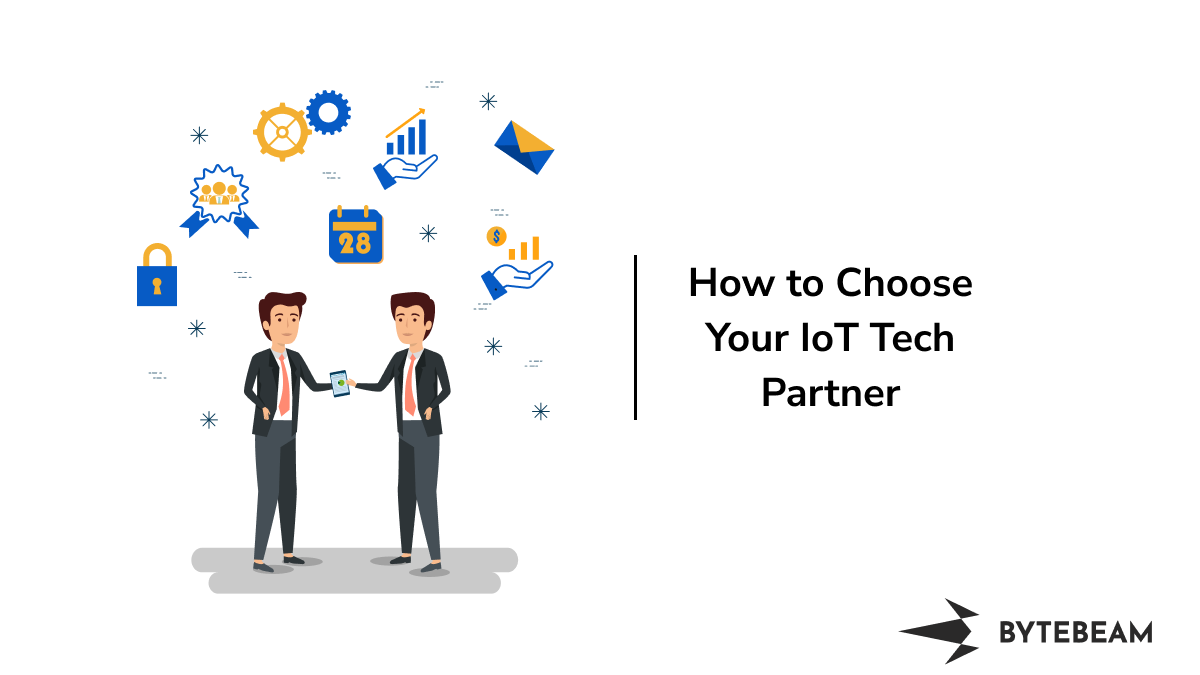10 Questions to Ask Before Choosing an IoT Technology Partner

The Internet of Things (IoT) is a fancy way of saying that we're connecting everyday objects to the internet - things like your thermostat, car, refrigerator, or even a light bulb. But when your business gets involved, IoT projects can be a daunting endeavor. Maybe you want to track your products as they're shipped around the world, or maybe you want to monitor the temperature in your warehouses. You have two main options:
Do it yourself: This means you'd need to understand the technology, design your system, buy the right devices, set them up, and keep them running smoothly. Just like if you decided to bake a cake from scratch, you'd need to know the recipe, get the ingredients, bake it, and clean up afterward.
Find a partner: This would be like buying the cake from a bakery. They have the recipe, the ingredients, the baking skills, and they'll even clean up. In the same way, an IoT tech partner understands the technology, they can design the system, they can get the right devices, set them up, and keep them running smoothly.
Doing it yourself could be tempting and give you more control, but it could also be difficult if you don't have the right skills or time. On the other hand, finding a technology partner might initially be more daunting, but they bring expertise and can save you time.
What to expect: In this article, we will help you assess whether you need a technology partner for your IoT projects. And if so, how you can choose one.
Do you need an IoT technology partner?
Choosing whether or not to partner with an IoT technology provider largely depends on the company's resources, expertise, and project requirements.
If your company has a strong in-house tech team with adequate knowledge about IoT, it might be possible to start and manage the IoT project independently. The benefits include full control over the project, more flexibility, and potential cost savings in the long term.
However, if IoT is a new field for your company or if the scope of the project is large or complex, partnering with an IoT technology provider might be beneficial. Here are a few reasons why:
- Expertise: IoT technology providers have the necessary expertise and experience in handling IoT projects. They can guide you through the complexities of IoT development, deployment, and management.
- Resources: Developing IoT solutions often require specialized equipment, software, and highly skilled personnel. An IoT tech partner usually has these resources readily available.
- Time to market: Partnering with an IoT provider can speed up the project since they are already familiar with the challenges and have established processes to deal with them. This can significantly reduce the time to market.
- Security: IoT security is a major concern, and a specialized IoT tech partner would have the knowledge and tools to ensure your IoT devices and data are secure.
- Scalability and maintenance: IoT projects often need to be scaled up over time, which could be challenging. A tech partner can handle this scaling process smoothly and also take care of the ongoing maintenance of the IoT system.
- Cost-effective: While there is a cost associated with partnering with an IoT provider, it may prove more cost-effective in the long run when considering the total cost of ownership, including design, implementation, operation, and maintenance costs.
So do you need to find an IoT tech partner before starting an IoT project? Not necessarily. But if you don't have the skills or time to do it yourself, it can be very helpful to partner with someone who does.
10 questions to ask before choosing a tech partner
Choosing the right IoT tech partner is a critical decision and should be made carefully. Here are some questions you might consider before making a choice:
1. What are our project goals and requirements?
Understanding your specific needs will help you choose a partner that can meet them. This could include the types of devices you want to connect, the data you want to collect, how the system should perform, what your budget is, and any specific security needs.
2. What is their expertise in IoT technology and understanding of your industry?
Look for a partner with a solid track record in IoT implementations and a deep understanding of your industry. This means they can anticipate needs and challenges, provide relevant solutions, and achieve project objectives more efficiently. Moreover, as no two IoT projects are the same, ask about their capabilities in providing dedicated solution support. A customized approach with tailored solutions is usually more effective than a one-size-fits-all strategy.
3. Does the partner company’s culture align with ours?
Successful partnerships often depend on shared values, effective communication, and a good working relationship. The organization’s culture also affects deadlines, detail-orientedness, turnaround times, and support efficacy. So it is important to make sure that the culture aligns with your expectations.
4. Can they deploy on-premise and do they offer cloud-agnostic solutions?
Depending on your organization's requirements, you might need an on-premise deployment or a cloud-based solution that isn't tied to a specific cloud provider. Ask your potential partner about their experiences with both and their ability to provide a solution that fits your needs. Moreover, inquire about their expertise on the underlying platform being used.
5. What kind of dedicated solutioning support do they provide post-implementation?
Given that no two IoT projects are identical, your IoT partner should be able to provide dedicated solutioning support tailored to your specific needs. This includes troubleshooting, system updates, or adapting the solution as your business requirements evolve. Rather than trying to optimize these services into other costs, consider choosing a partner who offers a comprehensive, paid support plan. This demonstrates their commitment to the success and long-term viability of your IoT project.
6. What is their approach to data security and privacy?
Given that IoT systems often handle sensitive data, security is crucial. Ask about their security protocols, how they handle data privacy, and if they comply with relevant regulations and standards. Below are some of the specific parameters you should consider:
- Compliance with regulations: The partner should adhere to the necessary data protection and privacy regulations such as GDPR (in Europe), CCPA (in California, USA), or other relevant laws depending on your location and market.
- Data encryption: Ask about their data encryption practices. Data should be encrypted both at rest (stored data) and in transit (while being transferred).
- Authentication and access control: Check how they manage authentication and access control. This includes how devices, users, and servers are authenticated to prevent unauthorized access.
- Data lifecycle management: It's essential to understand how they handle data throughout its lifecycle. This includes how data is collected, processed, stored, and deleted.
- Incident response: They should have a robust incident response plan to identify, react, and recover from security breaches swiftly.
- Patch management and updates: Regular software updates and patches are essential to fix security vulnerabilities. Ask how these are managed and deployed to devices.
- Privacy by Design: Find out if their solutions incorporate privacy by design principles, which means privacy is considered throughout the entire engineering process.
- Secure coding practices: Ensure they follow secure coding practices to prevent software vulnerabilities.
- Audits and certifications: Check if they have undergone security audits or hold certifications like ISO 27001 or SOC 2, indicating that they follow industry best practices for managing and securing data.
- User data access and control: Users should have access to their data and the ability to control how it's used, including the right to erase their data.
7. How scalable are their IoT solutions and can they support testing with simulated devices?
Your IoT needs might grow over time. Can the partner handle more devices, more data, or new features if needed? The partner should be able to accommodate growth and expansion without major overhauls, including handling increasing data flows and future-proofing their solutions. Their ability to test scalability using simulated devices can be crucial, as hardware scaling can be a lengthy process.
8. Do they provide user-friendly and flexible role-based access control?
With IoT solutions being a cross-functional tool, different team members may need access to different functionalities and data. For instance, your IT team might need access to over-the-air updates and remote debugging functionalities, while management might require access to high-level dashboards. Your potential IoT partner should provide a solution with an easy-to-use yet flexible role-based access control system. This system should allow customization according to each team member's role, thereby ensuring the right people have the right access to the necessary data and features.
9. What IoT platforms, devices, or technologies do they use, and can they build a device-agnostic solution?
Check whether their tech stack, their connectivity options, device compatibility, data processing capabilities, etc., align with your requirements. The exact requirements depend on your project but a partner that can assist you end-to-end is the ideal choice.
The technology your potential partner uses will influence the capabilities and limitations of your IoT solution. Ask about their experiences working with different devices and building device-agnostic solutions. As your product evolves, you'll likely employ various hardware types and the IoT platform should be able to handle this diversity.
10. How do they price their services and what is their value proposition?
Understand how they price their services and how it fits into your budget. If you don't expect recurring revenue from your customers, consider incorporating the lifetime cost of the IoT connectivity into the upfront cost of the hardware. Otherwise, understand what percentage of your recurring revenue would go into the IoT service spend. Beyond just the cost, also consider their unique value proposition and why they would be the best fit for your project.
By asking these questions, you can make an informed decision and choose a partner that is the best fit for your business and your IoT project.
The right fit
Choosing a technology partner for a dynamic domain like IoT demands comprehensive consideration. The ideal partner needs to adeptly address your current project needs, while also demonstrating the capability to accommodate future requirements.
A comprehensive solution such as Bytebeam shines in this regard, as we provide end-to-end management of all your IoT needs. A notable advantage of partnering with Bytebeam lies in our remarkable efficiency. We streamline your processes to significantly reduce your product's time-to-market—potentially launching within a swift three-week timeframe.
If you would like to know more about us, feel free to reach out to us for a quick call.


.png)
